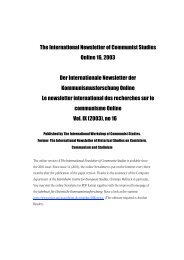VOL. XVI (2010), NO 23 - The International Newsletter of Communist ...
VOL. XVI (2010), NO 23 - The International Newsletter of Communist ...
VOL. XVI (2010), NO 23 - The International Newsletter of Communist ...
Erfolgreiche ePaper selbst erstellen
Machen Sie aus Ihren PDF Publikationen ein blätterbares Flipbook mit unserer einzigartigen Google optimierten e-Paper Software.
<strong>The</strong> <strong>International</strong> <strong>Newsletter</strong> <strong>of</strong> <strong>Communist</strong> Studies Online <strong>XVI</strong> (<strong>2010</strong>), no. <strong>23</strong> 15<br />
Tel: +45 33 93 25 75 - Fax: +45 33 14 52 58<br />
http://www.arbejdermuseet.dk/<br />
Moscow: Secret Katyn Documents Published on the Web.<br />
As a reaction to an order by the President <strong>of</strong> the Russian Federation, Dmitrii Medvedev,<br />
Rosarkhiv put online documents from the famous “Package N° 1” (RGASPI, f. 17 op. 166 d.<br />
621), handed from one Soviet leader to another and containing documents on the massacre<br />
<strong>of</strong> Katyn. Seven documents, digitized in color, are viewable online at<br />
http://rusarchives.ru/publication/katyn/spisok.shtml.<br />
Berlin: Biographical Article on Skoblevskii-Roze Published.<br />
Voldemārs Roze alias Petr Skoblevskii (1897-1939) has been a highly illustrious figure in the<br />
history <strong>of</strong> German communism: a Latvian Red Army commander, Roze was appointed leader<br />
<strong>of</strong> the “military apparatus” <strong>of</strong> the <strong>Communist</strong> Party <strong>of</strong> Germany in the wake <strong>of</strong> the “German<br />
October” 19<strong>23</strong>, sentenced to death in the “German Cheka-Trial” in 1925 and released into<br />
the Soviet Union in 1926 in exchange for German citizens. <strong>The</strong>re have been numerous<br />
confusions about the identity and biography <strong>of</strong> Roze in literature, scholarly and otherwise.<br />
Berlin-based historian Jacques Mayer has now published a seminal article (in German),<br />
compiling all known information on Roze from German, Russian and Latvian literature and<br />
enriching it with previously inaccessible archival materials. <strong>The</strong> article can be read online at<br />
http://nbn-resolving.de/urn:nbn:de:kobv:11-10098012.<br />
Journal Article on Archives in the Russian Province.<br />
<strong>The</strong> debate on an “archival counterrevolution” in Russia has been let intensely in the last<br />
years, yet it was to a large extent concerning only archives in Moscow and St. Petersburg.<br />
<strong>The</strong> situation in the Russian province has rarely been in the spotlight, and a recently<br />
published article by Sören Urbansky, doctoral candidate at Heidelberg University (Germany),<br />
has the aim to amend this disbalance. Urbansky accumulates his working experience during<br />
the past two years in the archives <strong>of</strong> East Siberia and the Russian Far East (Chita, Irkutsk,<br />
Vladivostok and Khabarovsk), as well as the experiences <strong>of</strong> two fellow researchers who<br />
have worked in Magadan and Tambov. <strong>The</strong> article <strong>of</strong>fers a highly differentiated picture <strong>of</strong> the<br />
archival situation outside the capitals, which makes it difficult to uphold the image <strong>of</strong> an<br />
“archival counterrevolution” throughout the whole Russia. In several aspects, regional<br />
archives are likely to provide a much more uncomplicated access to archival sources,<br />
declassifying previously secret files within a few days, or sometimes even allowing<br />
researchers to make photographs <strong>of</strong> archival documents. Yet not all regional archives<br />
maintain such a researcher-friendly policy, and especially in formal party archives<br />
researchers are sometimes confronted with obstacles comparable to those faced by<br />
historians in Soviet times, such as the confiscation and censorship <strong>of</strong> the researcher’s<br />
excerpts by the archival staff. Concerning the province’s FSB archives, the chance <strong>of</strong> access<br />
is even thinner than in Moscow. Nevertheless – as stated in the article – provincial archives<br />
can provide great possibilities for research, and anyone who is doing archival research on<br />
Soviet history should consult this article.<br />
Sören Urbansky: Auf in die Provinz! Recherchen in Russlands Regionalarchiven. In:














